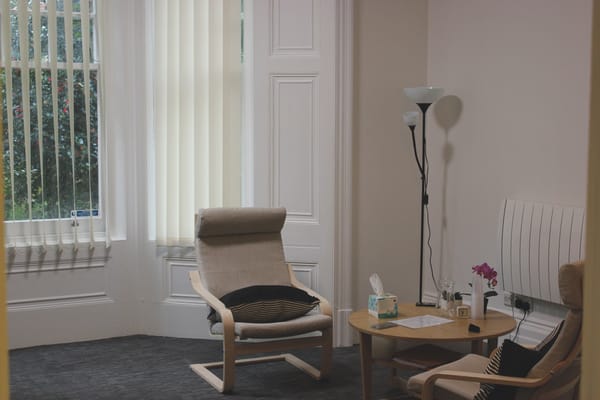Chemistry Introduces Roxy the Therapy Dog

The Chemistry department has introduced weekly sessions with a therapy dog this term, in conjunction with the charity Therapy Dogs Nationwide, as one of a set of new wellbeing initiatives.
Originally, the suggestion for a ‘dog day’ was requested by students and reps, but the department felt that regular sessions would benefit students much more than a one-off event. They organised the weekly sessions – three a month in South Kensington and one in White City – as a response, which began in August during the resit examinations and launched fully during Welcome Week.
Sessions last around fifteen minutes with up to four students, meaning Roxy usually sees up to 50 students each time she visits. The appointments are offered to undergraduate students, but staff and postgraduates in White City also regularly drop in.
The benefits of pet therapy have been well-documented in hospitals, as a method of relieving stress, encouraging physical activity, and as a boon to mental health. Small group sessions also encourage open and relaxed social engagements between students. Student feedback has noted that many miss pets at home, and visits with Roxy alleviate homesickness. Several students have visited regularly in a bid to teach Roxy new tricks.
Feedback thus far has included a wealth of positive statements from students. Examples from third years include “she’s the most wonderful dog”, “favourite member of the department”, “she’s a good dog and deserves more treats”, and “she needs to come to uni more!”, as gathered by wellbeing departmental representative Angharad Smith.
Amelia Barron, the Student Experience Officer in the department, said that there has been interest from wellbeing officers in other departments after she shared Chemistry’s plans and subsequent experience via an inter-departmental network of people in similar roles – which may lead to therapy dog sessions in other departments.
The initiative is one in a range being trialled by the Chemistry department, in a sincere effort to revitalise student satisfaction. Amelia said that “We are already getting positive feedback on this but we can and will continue to strive to do more. The voice of our students and their wellbeing drives what we do and we will continue to do everything we can to make the student experience as special as possible.”
Other new initiatives include increased wellbeing-related posts on social media via Twitter and Instagra, ‘ActiviTea’ sessions which get students relaxing with simple tasks while enjoying tea and a chat, and ‘ChemUnity’ lunches which bring students from all years to eat with key members of undergraduate staff. First years also now go bowling with personal tutors in Welcome Week, and similar sessions are set up for third and fourth years later in the term.
The results so far seem to be making a large impact on student sentiment – Francesca Wittmann, a 3rd year Chemistry wellbeing rep, gave glowing praise to the department.
“Of course there will always be stressful times at Imperial and the extent to which individual students feel it varies greatly. I think the department is very aware of this and does a great deal to try and help us all through it. From what I have been hearing from talking to my peers, they have been very positive about changes made over the summer to the way courses are run, and they feel that the department is listening to them.”
She feels that the continued low NSS scores are the result of the ‘delayed effect’ – NSS is filled out by final-year students, so the effect of changes being rolled out often are not reflected in NSS for three or more subsequent years. This was a thought echoed by the Union’s Deputy President (Education), Ashley Brooks, during an interview with Felix earlier in the year.







